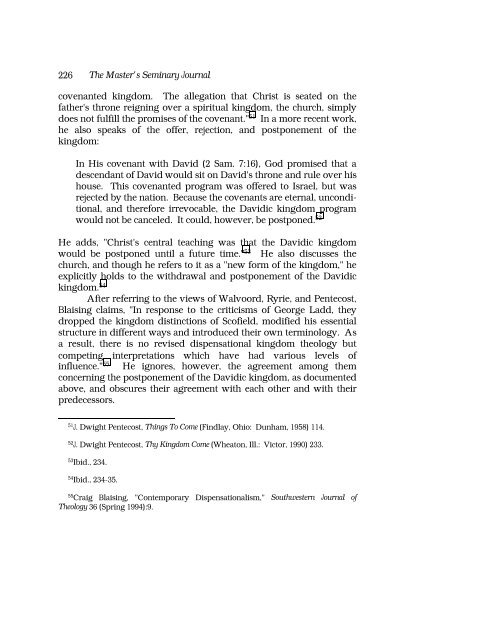The Dispensational View of the Davidic Kingdom - The Master's ...
The Dispensational View of the Davidic Kingdom - The Master's ... The Dispensational View of the Davidic Kingdom - The Master's ...
226 The Master's Seminary Journalcovenanted kingdom. The allegation that Christ is seated on thefather's throne reigning over a spiritual kingdom, the church, simplydoes not fulfill the promises of the covenant." 51 In a more recent work,he also speaks of the offer, rejection, and postponement of thekingdom:In His covenant with David (2 Sam. 7:16), God promised that adescendant of David would sit on David's throne and rule over hishouse. This covenanted program was offered to Israel, but wasrejected by the nation. Because the covenants are eternal, unconditional,and therefore irrevocable, the Davidic kingdom programwould not be canceled. It could, however, be postponed. 52He adds, "Christ's central teaching was that the Davidic kingdomwould be postponed until a future time." 53 He also discusses thechurch, and though he refers to it as a "new form of the kingdom," heexplicitly holds to the withdrawal and postponement of the Davidickingdom. 54After referring to the views of Walvoord, Ryrie, and Pentecost,Blaising claims, "In response to the criticisms of George Ladd, theydropped the kingdom distinctions of Scofield, modified his essentialstructure in different ways and introduced their own terminology. Asa result, there is no revised dispensational kingdom theology butcompeting interpretations which have had various levels ofinfluence." 55 He ignores, however, the agreement among themconcerning the postponement of the Davidic kingdom, as documentedabove, and obscures their agreement with each other and with theirpredecessors.51J. Dwight Pentecost, Things To Come (Findlay, Ohio: Dunham, 1958) 114.52J. Dwight Pentecost, Thy Kingdom Come (Wheaton, Ill.: Victor, 1990) 233.53Ibid., 234.54Ibid., 234-35.55Craig Blaising, "Contemporary Dispensationalism," Southwestern Journal ofTheology 36 (Spring 1994):9.
Dispensational View of the Davidic Kingdom 227Other normative dispensationalists have also argued for asimilar understanding of the Davidic kingdom. 56 Very recently, CleonRogers has reached the following conclusion concerning the Davidiccovenant:Both He [Christ] and His forerunner, John the Baptist, proclaimedthe Davidic kingdom promised in the Old Testament, but thismessage was rejected. So the Messiah presented a `new' form ofGod's rule on the earth, the church. . . . The rejection of Israel isnot permanent, for the kingdom will be restored when the Son ofDavid returns to set up the kingdom of David. Meanwhile Heoccupies the place of privilege and prominence, the `right hand ofthe Father,' where He rules as Head of the church and intercedesas High Priest according to the order of Melchizedek. Hisfollowers are called on to be His faithful witnesses in all the worldas they await His return, when He will defeat all enemies, assumeHis place on the Davidic throne, and set up the Davidickingdom. 57To underline further the pervasiveness of the teaching of therejection and postponement of the Davidic kingdom within thedispensational tradition, notice the attention given to the teaching byits critics. In 1945, O. T. Allis wrote the following about the"postponement theory":If it be admitted that a visible earthly kingdom was promised tothe Jews and announced as `at hand' by John and by Jesus, some56For example, see Renald Showers, There Really Is a Difference: A Comparison ofCovenant and Dispensational Theology (Bellmawr, N. J.: Friends of Israel GospelMinistry, 1990) esp. 97, 181-82; Herman Hoyt, The End Times (Chicago: Moody, 1969)167, 192.57Cleon Rogers, "The Davidic Covenant in Acts-Revelation," Bibliotheca Sacra 151(January-March 1994):84. See also "The Davidic Covenant in the Gospels," BibliothecaSacra 150 (October-December 1993):458-78. Also consider the following recent workby Stanley D. Toussaint, "The Contingency of the Coming of the Kingdom," Integrityof Heart, Skillfulness of Hands, Charles Dyer and Roy Zuck, eds. (Grand Rapids: Baker,1994) 222-37.
- Page 1 and 2: TMSJ 7/2 (Fall 1996) 213-239THE DIS
- Page 3 and 4: Dispensational View of the Davidic
- Page 5 and 6: Dispensational View of the Davidic
- Page 7 and 8: Dispensational View of the Davidic
- Page 9 and 10: Dispensational View of the Davidic
- Page 11 and 12: Dispensational View of the Davidic
- Page 13: Dispensational View of the Davidic
- Page 17 and 18: Dispensational View of the Davidic
- Page 19 and 20: Dispensational View of the Davidic
- Page 21 and 22: Dispensational View of the Davidic
- Page 23 and 24: Dispensational View of the Davidic
- Page 25 and 26: Dispensational View of the Davidic
226 <strong>The</strong> <strong>Master's</strong> Seminary Journalcovenanted kingdom. <strong>The</strong> allegation that Christ is seated on <strong>the</strong>fa<strong>the</strong>r's throne reigning over a spiritual kingdom, <strong>the</strong> church, simplydoes not fulfill <strong>the</strong> promises <strong>of</strong> <strong>the</strong> covenant." 51 In a more recent work,he also speaks <strong>of</strong> <strong>the</strong> <strong>of</strong>fer, rejection, and postponement <strong>of</strong> <strong>the</strong>kingdom:In His covenant with David (2 Sam. 7:16), God promised that adescendant <strong>of</strong> David would sit on David's throne and rule over hishouse. This covenanted program was <strong>of</strong>fered to Israel, but wasrejected by <strong>the</strong> nation. Because <strong>the</strong> covenants are eternal, unconditional,and <strong>the</strong>refore irrevocable, <strong>the</strong> <strong>Davidic</strong> kingdom programwould not be canceled. It could, however, be postponed. 52He adds, "Christ's central teaching was that <strong>the</strong> <strong>Davidic</strong> kingdomwould be postponed until a future time." 53 He also discusses <strong>the</strong>church, and though he refers to it as a "new form <strong>of</strong> <strong>the</strong> kingdom," heexplicitly holds to <strong>the</strong> withdrawal and postponement <strong>of</strong> <strong>the</strong> <strong>Davidic</strong>kingdom. 54After referring to <strong>the</strong> views <strong>of</strong> Walvoord, Ryrie, and Pentecost,Blaising claims, "In response to <strong>the</strong> criticisms <strong>of</strong> George Ladd, <strong>the</strong>ydropped <strong>the</strong> kingdom distinctions <strong>of</strong> Sc<strong>of</strong>ield, modified his essentialstructure in different ways and introduced <strong>the</strong>ir own terminology. Asa result, <strong>the</strong>re is no revised dispensational kingdom <strong>the</strong>ology butcompeting interpretations which have had various levels <strong>of</strong>influence." 55 He ignores, however, <strong>the</strong> agreement among <strong>the</strong>mconcerning <strong>the</strong> postponement <strong>of</strong> <strong>the</strong> <strong>Davidic</strong> kingdom, as documentedabove, and obscures <strong>the</strong>ir agreement with each o<strong>the</strong>r and with <strong>the</strong>irpredecessors.51J. Dwight Pentecost, Things To Come (Findlay, Ohio: Dunham, 1958) 114.52J. Dwight Pentecost, Thy <strong>Kingdom</strong> Come (Wheaton, Ill.: Victor, 1990) 233.53Ibid., 234.54Ibid., 234-35.55Craig Blaising, "Contemporary <strong>Dispensational</strong>ism," Southwestern Journal <strong>of</strong><strong>The</strong>ology 36 (Spring 1994):9.



